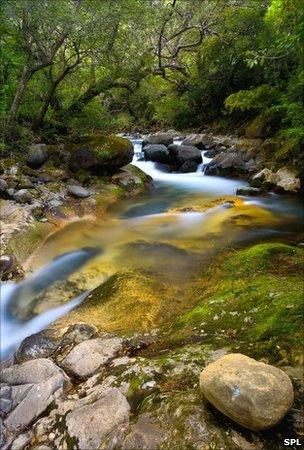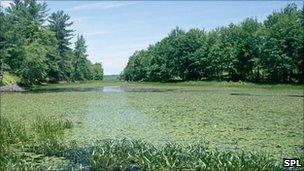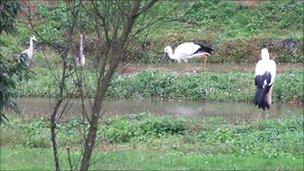Dollar trees line conservation road
- Published

Costa Rica's long-term aim is to pay for all the services that nature provides
Maybe money does grow on trees.
Certainly, you can find a growing number of people in the conservation movement suggesting that it does; and that if the money is to keep flowing, the wealth in the trees needs to be secured as safely as gold bars in any bank.
If forests do not actually sprout banknotes, they do provide services whose value in monetary terms can be measured... refuges for pollinating insects, roots that prevent landslides, absorption of climate-changing carbon dioixide - even places where we like to walk.
So do prairies and coral reefs and marshes and... well, pretty much any other life-bearing pieces of nature you care to mention.
A UN-backed project called The Economics of Ecosystems and Biodiversity (Teeb), external has calculated that destruction of forests alone is costing the global economy $2-5 trillion per year.
And at October's meeting of the UN Convention on Biological Diversity (CBD), virtually all of the world's governments pledged, external to look at changing their economic systems in order to reward behaviour that conserves and penalise activities that destroy; to pay to protect ecosystem services that bring humanity economic and other benefits.
Not from any hippyesque desire to save plants and animals; but because they believe it could make good economic sense.
From the conservationist's viewpoint, though, alarmed by the apparently relentless decline in global biodiversity, the motive may not matter.
"I think we need to look for innovative solutions that change the game a little bit," says Taylor Ricketts, director of the Conservation Science Programme with environmental group WWF.
"And I think this is one of them - aligning self-interest with conservation, as opposed to considering self-interest and the desire to make money and earn a living and develop economically to be a threat to biodiversity.
"If we're clever about it, we can align them so it actually re-inforces conservation."
Joshua Bishop, chief economist with the International Union for the Conservation of Nature (IUCN) and a major contributer to the Teeb report, agrees.
"Ecosystem services can be degraded or destroyed just as well as they can be produced," he says.
"If we don't look after the natural environment, we can no longer expect to receive the same quality or quantity of economic services that we've enjoyed in the past - hence the need for payment or some other incentive mechanism to encourage people to protect ecosystems instead of letting them deteriorate."
Holistic picture
The poster child for Payment for Ecosystem Services (PES) is Costa Rica.

Protecting the Catskills from pollutants was a cost-effective solution for New York's water supply
Back in the 1990s, concerned about the rapid loss of forests, its government took what was then a radical step: imposing a tax on fossil fuels, and using the proceeds to pay for forest protection.
"We came with the idea that the forest wouldn't be protected until we were fully able to recognise the economic services they were providing to society," says former Environment Minister Carlos Manuel Rodriguez.
Since then, the system has grown more complex, with financial incentives given for measures that conserve the water supply, which largely originates in forested land; and biodiversity is next on the agenda.
"There's a big industry in Costa Rica that makes profits out of biodiversity - that's ecotourism, and ecotourism generates revenues around $2bn per year, so that's an industry that uses biodiversity but doesn't pay for the access and for the use."
Charging them in order to preserve or even enhance the biodiversity they use should ensure it survives - for the benefit of those businesses, and everyone else, and nature itself.
One example where the economics worked out is found further north in the Americas - a far cry from Costa Rica's forests - in the water systems supplying New York City.
A generation ago, the Catskill Mountain reservoirs were under pressure, with excess fertiliser and unwise development compromising the supply of fresh water flowing to the teeming metropolis.
City authorities had a choice; build water treatment plants with concrete and chemicals, or restore the natural habitats that provided water good enough to drink.
The economics stacked up for nature; and a number of other cities in the Americas are finding the same thing.

Governments pledged at the UN biodiversity meeting to explore PES
But PES projects are not always what they seem.
At the CBD meeting, the Japanese hosts were keen to publicise a scheme blossoming in the district of Toyooka.
The focus of the scheme is the Oriental white stork, a gorgeous-looking black-and-white bird with red legs, standing about a metre high, with a wingspan twice as big.
When industrial agriculture arrived in Toyooka in the decades after World War II, the food that storks need were wiped away in a chemical tide... and the storks took their leave.
"When herbicides were introduced, I saw all the fish in the river floating after the chemicals were used," recalls rice farmer Tsuyoshi Nawate when I meet him at the Toyooka stork breeding and visitors' centre.
"Although the chemicals are now weaker than they were then, I still cannot get rid of that image. I am from this district, and so I am keen to find a way of co-existing with the storks and building an environment that allows storks to live."
Some years ago, farmers, the town council and environmental groups came together to design a project that tempts the birds back by encouraging organic agriculture.
A minority of fields are farmed this way, but enough to provide the food the storks need.
The organic rice is sold at a premium, in sacks that proclaim its "stork-friendly" nature. Bottles of stork-friendly sake, made from the rice, nestle alongside.

The Toyooka storks are back - but is this really a PES project, or something more fundamental?
The storks are most definitely back. And so, accordingly, are tourists, hundreds of thousands of them streaming into Toyooka each year, providing revenue that is helping restore natural wetlands that provide even better habitat for the birds.
But is this a true PES project?
Talking to Mr Nawate and his fellow farmers, it is clear money is not their only motivation.
"We do it both for the good income, and the nice sight of the storks flying over the paddy fields," he says.
"Looking at storks flying has moved peoples' focus away from just economic aspects to a more environment-friendly way of looking at things."
Hiroe Ishihara from Cambridge University is studying economic and social aspects of stork rehabilitation, and is not convinced.
"I think we should say that farmers are not just involved because of the money issue, because it's really difficult to gain money out of rice production in the current situation in Japan," she says.
"So I think there have to be social or other values that attach to the stork conservation itself - I don't think you can put a price on that."
Money concerns
And that reflects one concern people raise about the PES concept; is it really the most effective way to mobilise support for conservation?
Would it not be better simply to raise interest in nature, in its intrinsic benefits and beauty, and ensure societies protect it for its own sake?
Biodiversity glossary
The counter-argument is that despite decades of conservation, the global picture shows biological diversity declining, with potential tipping-points in sight; so something new has to be attempted.
And more and more governments are at least flirting with PES.
In the EU and US, farmers are rewarded for managing the land in ways that benefit birds, mammals and insects.
Agrochemical and seed company Syngenta is financing training for farmers to help them look after pollinating insects.
Soft-drink companies are funding the preservation of landscapes that ensure the water supply they need.
A fledging market in "biodiversity offsets" is developing, allowing companies to protect nature in one place in recompense for degrading it somewhere else.

The European Environment Agency recently warned that over-use of resources threatened growth
These are fledgling steps - but steps they are.
Yet even those people persuaded of the merits of PES do not see it as a complete panacea.
"There's a real danger of under-valuing (ecosystems such as forests)," says Taylor Ricketts.
"If we pick only one or two of these benefits and their economic values and compare them to the value of cut timber, that analysis is not going to go in conservation's favour - we're going to lose the cost-benefit analysis more often than we win it."
And Carlos Manuel Rodriguez cautions that PES on its own cannot be enough - other policies are also needed if natural systems such as forests are to profit, especially enforcing the rule of law and eliminating subsidies that encourage the destruction of biodiversity.
Putting it all together, he says, is a proven package.
"The final outcome - Costa Rica has been able to reverse the rate of deforestation, we have probably twice as much forest as we had 20 years ago," he says.
"That doesn't mean the whole package of biodiversity is coming back - it will take, I don't know, 100, 150 years - but we are setting the base for that, and we see that we can grow, at the same time we can protect nature, enhance nature and use nature as an economic driver."
Revolution road
If governments take the pledge they made at the CBD meeting seriously, then within a decade the world could be embroiled in an economic revolution, where destruction is taxed and conservation rewarded.
The theory holds that citizens will win, through the preservation of environment that is both socially valued and economically valuable.
But at the corporate level, who would win and who would lose?
"In the forestry sector, for example, companies that are able to combine biodiversity conservation, carbon storage and watershed protection with the production of pulp and paper - they will do well," says IUCN's Josh Bishop.
"I suppose that if there are losers, it's those who are not looking ahead - those who are taking for granted existing technologies, existing prices.
"They'll go out of business - and why shouldn't they?"
You can find out more about Payment for Ecosystem Services, and how the concept is being used on four continents, in this week's edition of One Planet on the BBC World Service.
- Published13 July 2010
- Published30 November 2010
- Published22 September 2010
- Published28 October 2010
- Published20 October 2010